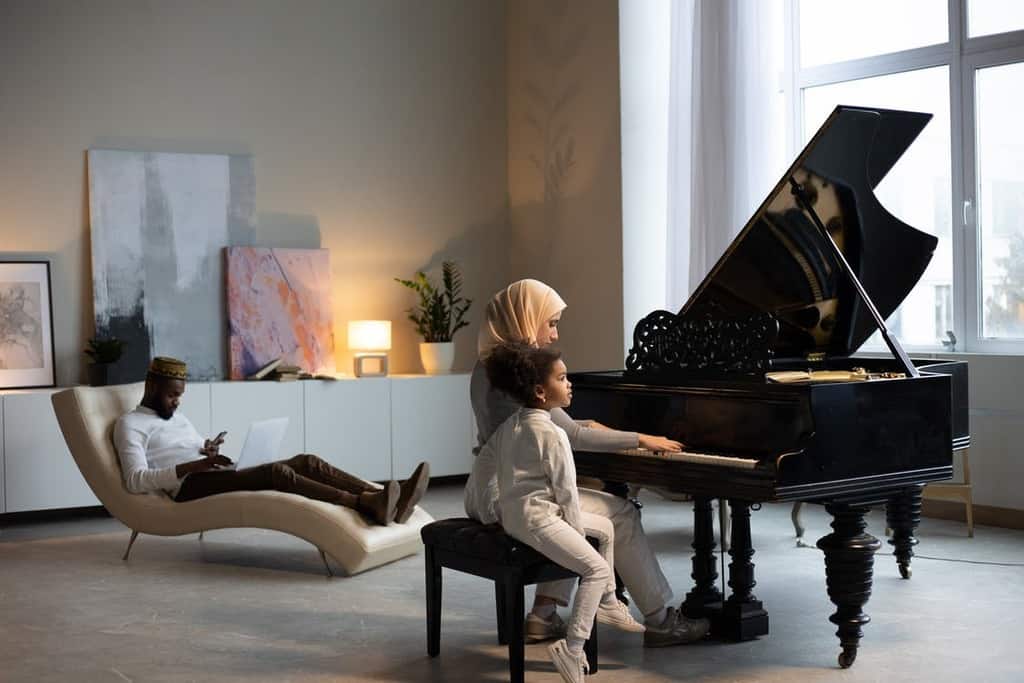Piano Blog by Skoove – Piano Practice Tips
Life is crazy, we all know. Time seems to be speeding up and out of control, especially this last year. Whether it is your new or changing responsibilities at work, spending time with your family and friends, or scrolling through some news or spacing out on your phone or computer screen, there is no shortage of events demanding your attention. You may find yourself wondering how it would even be possible to find time to practice piano right now?
It’s true. It is difficult to carve a slice of time out of a packed schedule to practice. Even professional musicians struggle with this! However, the key to successfully balancing work, music, and family and friends is simple and found right in the title of this article: you have to make time to make music!
If you are enjoying these posts, consider checking out Skoove’s piano lessons for adults! With over 400 lessons and counting, Skoove has something to offer for any level player. The integrated listening program responds in real time to your playing, helping you to improve and making piano practice fun and easy. Plus, if you get stuck, Skoove has many excellent instructors waiting to answer any questions you might have.
Consistency is key
Consistency is key when trying to balance life’s responsibilities with music practice. Working out at the gym for 2 hours one day per week is not going to make you stronger. But, working out 5 days at the gym for 25 or 30 minutes will make you stronger. You will not become healthier just by eating one or two healthy meals per week and fast food the rest of the time. If you want steady results, you need consistent habits.
You will make more progress and have more fun with music if you can make a consistent effort to practice, no matter how much time you have. 45 minutes the day before your lesson is not going to have the same effect as 10 minutes per day for 5 days. You can fit in 10 minutes per day of piano practice, right?
Set a schedule
No one is going to just give you the time to practice piano. You need to make time for yourself. So set a schedule! Try setting a timer for 30 minutes, every day, right after dinner. Easy. Done. Goes by fast. Or you could try incorporating practice time first thing in the morning before breakfast. Perfect, consistent, done, and then you can move on with your day having started with a stress relieving and creative activity.
So whether it is on your lunch break, around 6 am before your kids wake up, for 20 minutes when you get home to relax and unwind, or for 30 minutes before bed to help calm your mind, set yourself a schedule for your practice time. That way you don’t have to stress about fitting in practice time around everything else you need to accomplish. You may also find that scheduling practice time like this leads you to schedule other events in your life in a similar manner, and consequently helps you to become more organized!
Build a routine
Similar to setting a schedule for your practice time, building a practice routine for yourself is an extremely useful strategy especially when your practice time is limited. If you know exactly what you are going to practice and for how long, then it becomes easier to manage. Additionally, you can learn to isolate and identify the components that make a skilled pianist. Building and following a practice routine is also a sure way to achieve measurable results and goals in your progress, which will serve to boost your confidence in your playing and increase your satisfaction and joy – which is what we all want!
Get the whole family involved!
If you are worried about missing out on family time to practice piano, then skip the worry and get your whole family involved in music! Playing music together is a wonderful experience and a great way to spend time together as a family. Additionally, you can then expose your family to some of the benefits of playing the piano and get them motivated to engage with music more in their own lives. You could even form a family band!

Don’t stress and don’t compare
One of the quickest ways to lose motivation in music is to stress about practicing and to compare your skills and progress with other famous musicians. Remember, the key is to play music. You should bring this feeling of play to the piano every time. It should be like a game, not a chore. Once it becomes a chore, then it becomes boring and tiresome and you can become resentful of the piano and yourself. Avoid this trap by not stressing about your practice too much!
Likewise, a sure path to depression is to compare yourself negatively to other musicians around, especially if you are starting your education in music at a later time in life. So take your favorite artists as inspiration, whoever they happen to be. Listen to their music, watch their interviews and concerts with your family and friends, but don’t get down on yourself because you won’t get to their level. Every person’s journey with music is unique, and that is part of what makes learning music so exciting and enjoyable.
Stay excited and pay attention!
Practicing music can take many forms. For example, you could begin keeping a listening journal. Take 10 minutes, 3 times per week, and consciously listen to a song you enjoy. Listen to it in your headphones in a quiet place, free from distractions. In your journal, write down your thoughts about the song. Why does the piano in this part make me feel a certain way? Or why do the drums enter where they do and not sooner or later? You can do a similar practice during your lunch break or on the train. Sit quietly and silence your thoughts. Just listen to the conversations you hear around you, the sounds of people walking, or the sound of the winds and the birds. Do you consider this type of sound to be music?
What is music to you? Is music a particular song? Or a particular artist? Or is it a feeling, an event, or an emotion? This is an important question to ask yourself as you try to balance practice time with the rest of your life. Staying excited about music is key. Finding new songs to listen to, finding new sources of inspiration, and avoiding stagnation are all crucial to enjoying music. After all, if you enjoy it, you will make time for it, right? Practicing music is incredibly healthy for you, for your mind, body, and spirit, and is an extremely important element to the human experience. So, get started with the best online piano lessons today!
Try out your free trial of Skoove today!
Author of this blog post

Eddie Bond is a multi-instrumentalist performer, composer, and music instructor currently based in Seattle, Washington USA. He has performed extensively in the US, Canada, Argentina, and China, released over 40 albums, and has over a decade experience working with music students of all ages and ability levels.
Read More
This article is from an external source and may contain external links not controlled by Empeda Music.

